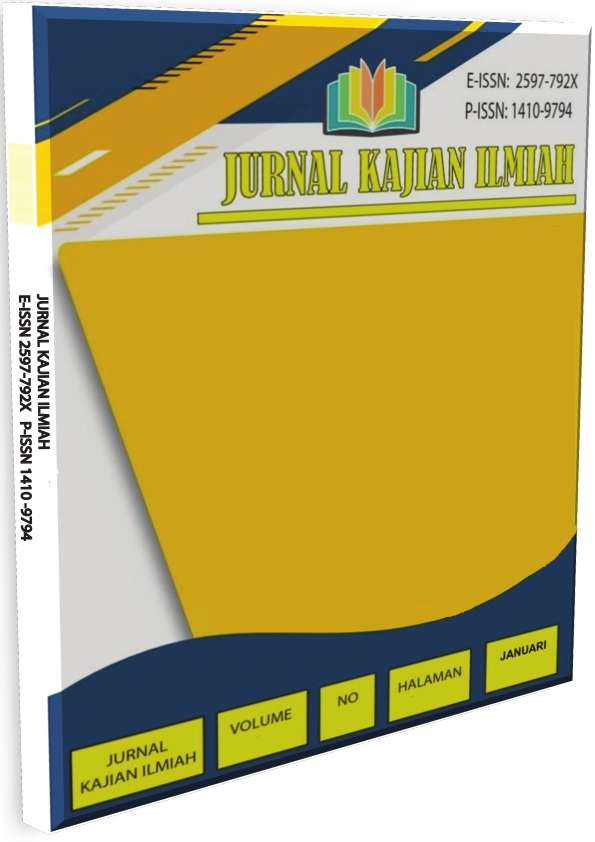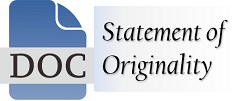Penerimaan Diri Sebagai Prediktor Fear of Negative Evaluation Pada Emerging Adulthood di Indonesia
DOI:
https://doi.org/10.31599/89tz4250Keywords:
Emerging Adulthood, Fear Of Negative Evaluation, Self AcceptanceAbstract
Emerging adulthood is a period of transition from adolescence to adulthood that generally occurs in the age range of 18-25 years. In this transition period, developmental tasks become more complex due to the demands of greater responsibilities such as education, marriage, work, and so on. Social and personal expectations put pressure on individuals emerging adulthood. If one cannot meet the expectations of others and has maladaptive perfectionism, the individual is likely to experience anxiety, including fear of negative evaluation. Fear of negative evaluation may indicate low self-acceptance. Therefore, this study aims to identify whether or not there is a relationship between self-acceptance and fear of negative evaluation in emerging adulthood. The method used is a quantitative method with a correlational design. Participants were selected through purposive sampling with the criteria of 18 to 25 years old and Indonesian citizenship. 182 participants participated in this study. Measurement of both variables in this study used the Brief-Fear of Negative Evaluation instrument (BFNE-II) and the self-acceptance sub-scale of Psychological Well-being. The hypothesis test analysis used a non-parametric correlation test, namely the Spearman Rho test. The findings of this study indicate a relationship between self-acceptance and fear of negative evaluation in emerging adulthood in Indonesia, with a significance value of ,000 and a negative nature of the relationship (-0.184). This can be an illustration of the relationship between the two variables.
Downloads
References
Arnett, J. J. (2014). Emerging Adulthood: The Winding Road from the Late Teens Through the Twenties (2nd edition). Oxford University Press. https://doi.org/10.1093/acprof:oso/9780199929382.001.0001
Baharshanjani, N., & Taherifar, Z. (2022). The relationship between parenting styles and social anxiety symptoms with the mediating role of fear of negative evaluation. Journal Of Family Relations Studies, 2(6), 22–31. https://doi.org/10.22098/jhrs.2022.11311.1061
Calissano, C., Haenschel, C., Flaxman, P. E., & Zernerova, L. (2021). Influence of perfectionism on short-term anxious reactivity to a social-evaluative stressor. Personality and Individual Differences, 173, 1–5. https://doi.org/10.1016/j.paid.2021.110626
Camp, J., Vitoratou, S., & Rimes, K. A. (2020). LGBQ+ Self-Acceptance and Its Relationship with Minority Stressors and Mental Health: A Systematic Literature Review. Archives of Sexual Behavior, 49(7), 2353–2373. https://doi.org/10.1007/s10508-020-01755-2
Carleton, R. N., McCreary, D. R., Norton, P. J., & Asmundson, G. J. G. (2006). Brief fear of negative evaluation scale - revised. Depression and Anxiety, 23(5), 297–303. https://doi.org/10.1002/da.20142
Chamberlain, J. M., & Haaga, D. A. F. (2001a). Unconditional self-acceptance and psychological health. Journal of Rational-Emotive & Cognitive-Behavior Therapy, 19(3), 163–176. https://doi.org/https://doi.org/10.1023/A:1011189416600
Chamberlain, J. M., & Haaga, D. A. F. (2001b). Unconditional self-acceptance and responses to negative feedback. Journal of Rational-Emotive & Cognitive-Behavior Therapy, 19(3).
Cook, S. I., Moore, S., Bryant, C., & Phillips, L. J. (2022). The role of fear of positive evaluation in social anxiety: A systematic review and meta-analysis. Clinical Psychology: Science and Practice, 29(4), 352–369. https://doi.org/10.1037/cps0000082
Floricica, C. M., & Tasențe, T. (2022). Self-acceptance in today’s young people. In Technium Social Sciences Journal (Vol. 38, pp. 367–379). www.techniumscience.com
Fredrick, J. W., & Luebbe, A. M. (2020). Fear of positive evaluation and social anxiety: A systematic review of trait-based findings. Journal of Affective Disorders, 265, 157–168. https://doi.org/10.1016/j.jad.2020.01.042
Hannush, M. J. (2021). Acceptance: The capacity for acceptance of self, others, and life itself. In M. J. Hannush (Ed.), Markers of Psychosocial Maturation: A Dialectically-Informed Approach (pp. 261–283). Springer International Publishing. https://doi.org/10.1007/978-3-030-74315-4_17
Hasberry, A. (2019). Self-acceptance in black and white. Education Sciences, 9(2), 1–20. https://doi.org/10.3390/educsci9020143
Hochberg, Z., & Konner, M. (2020). Emerging adulthood, a pre-adult life-history stage. In Frontiers in Endocrinology (Vol. 10, pp. 1–12). Frontiers Media S.A. https://doi.org/10.3389/fendo.2019.00918
Huang, A. B., & Berenbaum, H. (2017). Accepting our weaknesses and enjoying better relationships: An initial examination of self-security. Personality and Individual Differences, 106, 64–70. https://doi.org/10.1016/j.paid.2016.10.031
Ilma, V. A., & Muslimin, Z. I. (2020). Self-Acceptance from aqidah and gender perspectives. Annual International Conference on Social Sciences and Humanities (AICOSH 2020). https://doi.org/10.2991/assehr.k.200728.044
Karababa, A. (2020). The moderating role of hope in the relationship between maladaptive perfectionism and anxiety among early adolescents. Journal of Genetic Psychology, 181(2–3), 159–170. https://doi.org/10.1080/00221325.2020.1745745
Kivity, Y., Tamir, M., & Huppert, J. D. (2016). Self-acceptance of negative emotions: The positive relationship with effective cognitive reappraisal. International Journal of Cognitive Therapy, 9, 1–16.
Kusumastuti, A., Khoiron, A. M., & Achmadi, T. A. (2020). Metode penelitian kuantitatif. Deepublish.
Maresh, E. L., Teachman, B. A., & Coan, J. A. (2017). Are you watching me? Interacting effects of fear of negative evaluation and social context on cognitive performance. Journal of Experimental Psychopathology, 8(3), 303–319. https://doi.org/10.5127/jep.059516
Matud, M. P., Díaz, A., Bethencourt, J. M., & Ibáñez, I. (2020). Stress and psychological distress in emerging adulthood: A gender analysis. Journal of Clinical Medicine, 9(9), 1–11. https://doi.org/10.3390/jcm9092859
Neppl, T. K., Jeon, S., Schofield, T. J., & Donnellan, M. B. (2015). The impact of economic pressure on parent positivity, parenting, and adolescent positivity into emerging adulthood. Family Relations, 64(1), 80–92. https://doi.org/10.1111/fare.12098
Putri, H. M. (2015). Analisis faktor risiko fear of negative evaluation. Seminar Psikologi & Kemanusiaan, 492–500.
Reynolds, W. M. (1982). Development of reliable and valid short forms of the marlowe-crowne social desirability scale. Journal of Clinical Psychology, 38(1), 119–125. https://doi.org/https://doi.org/10.1002/1097-4679(198201)38:1<119::AID-JCLP2270380118>3.0.CO;2-I
Ryff, C. D. (1989). Happiness is everything, or is it? explorations on the meaning of psychological well-being. Journal of Personality and Social Psychology, 57(6), 1069–1081. https://doi.org/https://doi.org/10.1037/0022-3514.57.6.1069
Shahul, A., Krishna M, S., Thomas, S. S., Thaha, V. K., & John, J. M. (2022). Fear of negative evaluation and emotional/social loneliness in young adults. International Journal of Engineering Technology and Management Sciences, 6(5), 505–509. https://doi.org/10.46647/ijetms.2022.v06i05.078
Steele, E. H., & McKinney, C. (2019). Emerging adult psychological problems and parenting style: Moderation by parent-child relationship quality. Personality and Individual Differences, 146, 201–208. https://doi.org/10.1016/j.paid.2018.04.048
Sugiyono, S. (2022). Metode Penelitian Kuantitatif Dan Kualitatif Dan R&D. Alfabeta Bandung.
Torres-Guijarro, S., & Bengoechea, M. (2017). Gender differential in self-assessment: a fact neglected in higher education peer and self-assessment techniques. Higher Education Research and Development, 36(5), 1072–1084. https://doi.org/10.1080/07294360.2016.1264372
Trompeter, N., Bussey, K., Hay, P., Griffiths, S., Murray, S. B., Mond, J., Lonergan, A., Pike, K. M., & Mitchison, D. (2019). Fear of negative evaluation among eating disorders: Examining the association with weight/shape concerns in adolescence. International Journal of Eating Disorders, 52(3), 261–269. https://doi.org/10.1002/eat.23018
Varughese, A. S., Biju, A. A., Varghese, A. S., Varghese, J. S., & Mathews, K. D. (2022). Procrastination, fear of negative evaluation and perceived stress among emerging adults. International Journal of Engineering Technology and Management Sciences, 5(6), 450–454. https://doi.org/10.46647/ijetms.2022.v06i05.070
Watson, D., & Friend, R. (1969). Measurement of social-evaluative anxiety. Journal of Consulting and Clinical Psychology, 33(4), 448–457. https://doi.org/https://doi.org/10.1037/h0027806
Wojnarowska, A., Kobylinska, D., & Lewczuk, K. (2020). Acceptance as an emotion regulation strategy in experimental psychological research: What we know and how we can improve that knowledge. In Frontiers in Psychology (Vol. 11). Frontiers Media S.A. https://doi.org/10.3389/fpsyg.2020.00242
Wood, D., Crapnell, T., Lau, L., Bennett, A., Lotstein, D., Ferris, M., & Kuo, A. (2018). Emerging adulthood as a critical stage in the life course. In Handbook of Life Course Health Development (pp. 123–143). Springer International Publishing. https://doi.org/https://doi.org/10.1007/978-3-319-47143-3_27












_-_Copy1.jpg)




